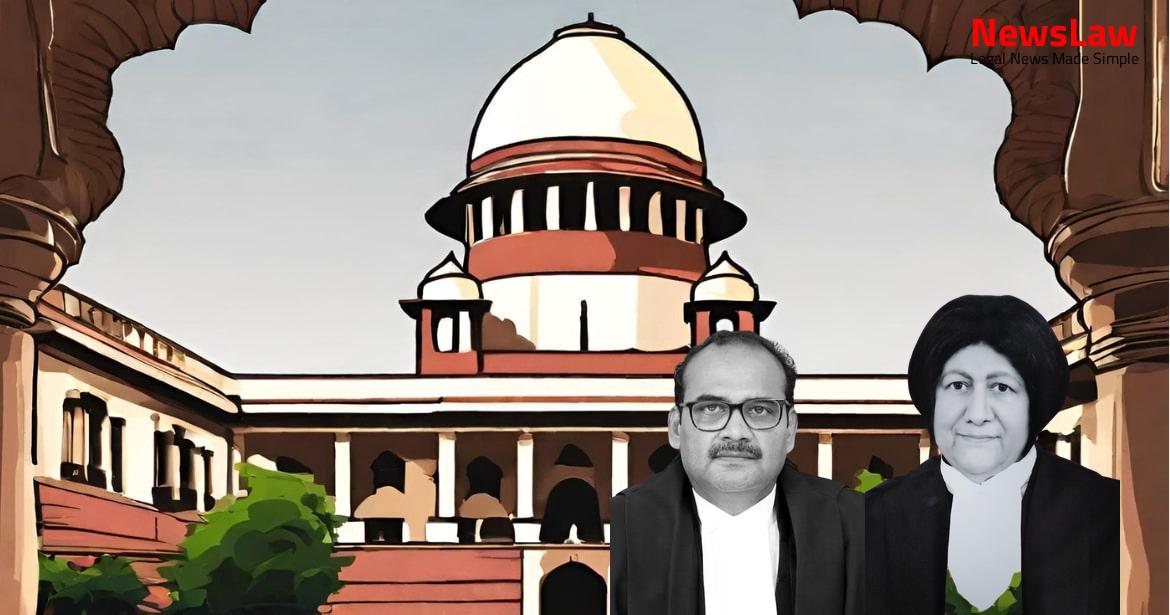Delve into the recent judgment by the High Court of Madhya Pradesh concerning the case of commutation of a death penalty to fixed imprisonment. The decision addresses crucial factors like the appellant’s age and background, shedding light on the complexities of the justice system. Stay informed about this significant legal development! #HighCourtMPh #JusticeServed
Facts
- The Division Bench of the High Court of Madhya Pradesh at Jabalpur dismissed the appellant’s appeal.
- The Trial Judge convicted the appellant for offenses under Sections 450, 376(2)(i), 376D, 376A, and 302 read with 34 of the IPC as well as under Section 5(g)/6 of the POCSO Act.
- The appellant was sentenced to death under Sections 376A and 302 IPC, life imprisonment under Section 376D IPC, and 10 years rigorous imprisonment under Section 450 IPC.
- The judgments of the Trial Judge were upheld by the High Court, confirming the convictions and sentences imposed on the appellant.
Also Read: Case Summarization: Revisiting the Power of Summoning Additional Accused
Arguments
- The case is based on three dying declarations and a DNA report.
- The DNA report indicates the presence of a third person.
- There were improvements in the dying declarations as time progressed.
- The Trial Judge did not consider the balance between mitigating and aggravating circumstances in awarding the death penalty.
- Considering the appellant’s background, age at the time of the crime, and behavior in prison, commutation of sentence is warranted.
- The order convicting and imposing the death penalty were simultaneous.
- The truthfulness of the dying declarations is doubtful, casting doubt on the conviction.
- The case is not considered a ‘rarest of the rare’ scenario warranting the death penalty.
- The dying declarations are inconsistent, raising doubts on the sustainability of the conviction.
- The DAG for the respondent-State relies on specific judgments to argue against commutation based solely on the appellant’s age.
- The DAG asserts that the Trial Judge and High Court correctly found the appellant guilty after reviewing the evidence.
- The DAG points out that the psychological report indicates lack of remorse from the appellant.
- Based on lack of remorse and other factors, the DAG argues for confirming the death penalty.
- The DAG emphasizes that the appellant took advantage of the victim being alone to commit the crime, making it a ‘rarest of the rare’ case.
Also Read: Quashing of Detention Order in the Case of Appisseril Kochu Mohammed Shaji
Analysis
- Age of the appellant at the time of the crime, along with other factors, can be considered in deciding whether the death penalty should be commuted or not.
- Dying declaration by the deceased, supported by oral testimonies, implicates the appellant in the crime.
- Concurrent convictions by Trial Judge and High Court stand valid for the appellant’s offenses under various sections of IPC and POCSO.
- The appellant’s tender age of 22 and socio-economic background are taken into account.
- Evidence from Dehat Nalishi and medical officer endorse the deceased’s allegations against the appellant.
- Pyschological assessments and prison reports indicate satisfactory behavior and engagement in positive activities by the appellant.
- Appellant’s childhood losses and family background are considered in the decision-making process.
- Absence of criminal history in the appellant and his family members is noted in the analysis.
- The confirmation of death penalty would not be justified in the present case.
- The possibility of the appellant being reformed cannot be ruled out.
- The appellant is not considered a hardened criminal who is beyond reform.
- In the present case, the death penalty is commuted to fixed imprisonment without remission for 20 years.
- The ordinary sentence of life imprisonment (14 years with remission) is deemed insufficient in this case.
Also Read: Environmental Impact Assessment of GPP Operations in Pune: A Supreme Court Verdict
Decision
- The present case falls in the middle path as laid down in previous judgments
- Order of conviction is maintained
- Death penalty awarded under Sections 376A and 302 IPC is commuted to rigorous imprisonment for 20 years
- Appeals allowed to the extent indicated above
Case Title: RABBU @ SARVESH Vs. THE STATE OF MADHYA PRADESH (2024 INSC 720)
Case Number: Crl.A. No.-000449-000450 – 2019



